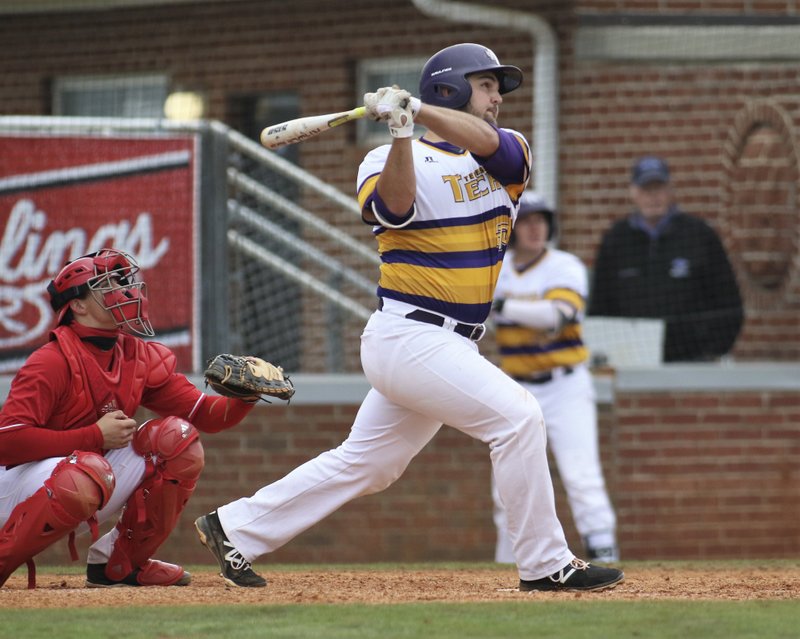The longest winning streak in Division I baseball right now belongs to a team from the Ohio Valley Conference that has only four NCAA Tournament victories in program history.
The second-longest streak belongs to a Big Ten school with one of the most identifiable brands in the country -- but which has its own challenges to overcome on the baseball diamond.
Tennessee Tech and Michigan don't have much in common when it comes to college sports, but at the moment, they can certainly relate. The Golden Eagles have slugged their way to 26 consecutive victories. The Wolverines have won 20 in a row, outpitching opponents in the cool northern air.
Both teams still have a way to go to match the Division I record of 34 consecutive victories, set by Texas in 1977 and Florida Atlantic in 1999. It's a record Tennessee Tech Coach Matt Bragga knows well because his teenage son reminds him.
"Our son, Luke, told me about three weeks ago (that it's) 34 you've got to get to," Bragga said. "But honestly, outside of our son Luke, who's 13, I haven't thought about it at all."
As of Thursday, Tennessee Tech (35-5) had hit 33 more home runs and had scored 80 more runs than any other team in the country. Michigan has bounced back from a 4-11 start to move atop the Big Ten, a league that's made strides the last few years.
When Erik Bakich took over as Michigan's coach in 2012, the Big Ten was struggling to stay relevant in college baseball. A year earlier, the league put only one team in the NCAA Tournament. There was talk that the conference should move its baseball schedule to the summer and perhaps give up on competing for NCAA titles in that sport.
Instead, the league has steadily improved.
In 2013, Indiana became the first Big Ten member to play in the College World Series since Barry Larkin and Michigan made it in 1984. Last year, the conference put five teams in the NCAAs for the second time in three seasons.
"Midwest kids are recognizing that they don't have to go south to get the baseball experience they want," said Bakich, whose team begins a three-game series at Iowa tonight. "Kids outside of the Big Ten are recognizing that they can come to the Midwest and come to these Big Ten schools and get a great education and play baseball at the highest level."
For all its resources, a school like Michigan still can't control the local weather, which is an issue for an outdoor sport that starts in February. This year, the Wolverines played their first 14 games in Florida, California and Tennessee.
"When you're on the road, you spend a lot of time -- 24 hours a day -- with the same guys," left-hander Tommy Henry said. "So it definitely builds team unity from that regard. And I also say that we're lucky enough to be at the University of Michigan and have an athletic department that supports us traveling all around the country."
When Michigan finally played its first home game March 14, it lost to Lawrence Tech, an NAIA school. Not long after that, Michigan would make the Final Four in both basketball and hockey -- the type of success the school is known for in so many sports.
"A lot of this started because we felt like we weren't upholding really what Michigan and the block 'M' is all about," Bakich said. "The inspiration that it draws just from watching basketball and hockey and all these other sports have tremendous success."
Michigan (24-11) hasn't lost since that game against Lawrence Tech. The schedule has been more favorable. The Wolverines have played 16 of their 20 games at home during this streak. As of Thursday, Michigan was just 50th in the RPI.
But even if you include that rough first month of the season, the Wolverines still have the second-best team ERA in the Big Ten. Henry is 7-0 and second in the league in strikeouts.
While Michigan has relied on pitching, Tennessee Tech has the nation's most potent lineup.
Tennessee Tech averages 11.4 runs per game and leads the nation in batting average (.357), on-base percentage (.454) and slugging percentage (.641). Nobody else in the country has a slugging percentage higher than .525.
Tennessee Tech is on pace to rank fourth in NCAA single-season history in home runs per game, tied for fourth in runs per game and fifth in slugging percentage.
Those statistics back up the confidence of a team that entered the season with sky-high expectations.
"We were shooting pretty high," senior first baseman Chase Chambers said. "We were shooting for Omaha, if I'm being honest. Everybody here believes we can make it to Omaha, and it seems like we're showing it."
Sports on 04/27/2018

